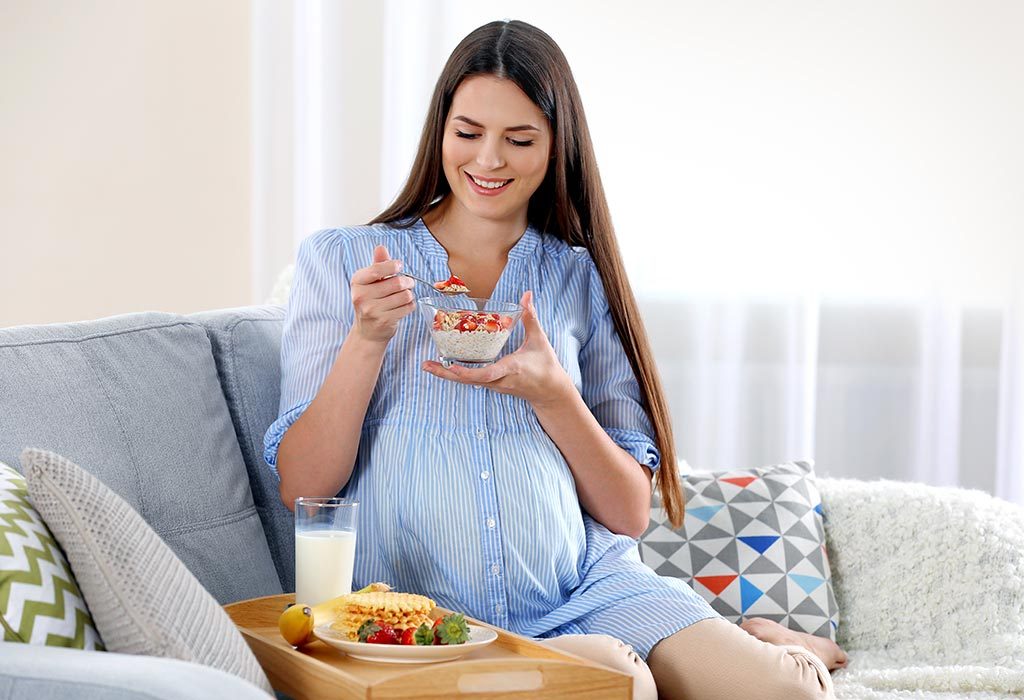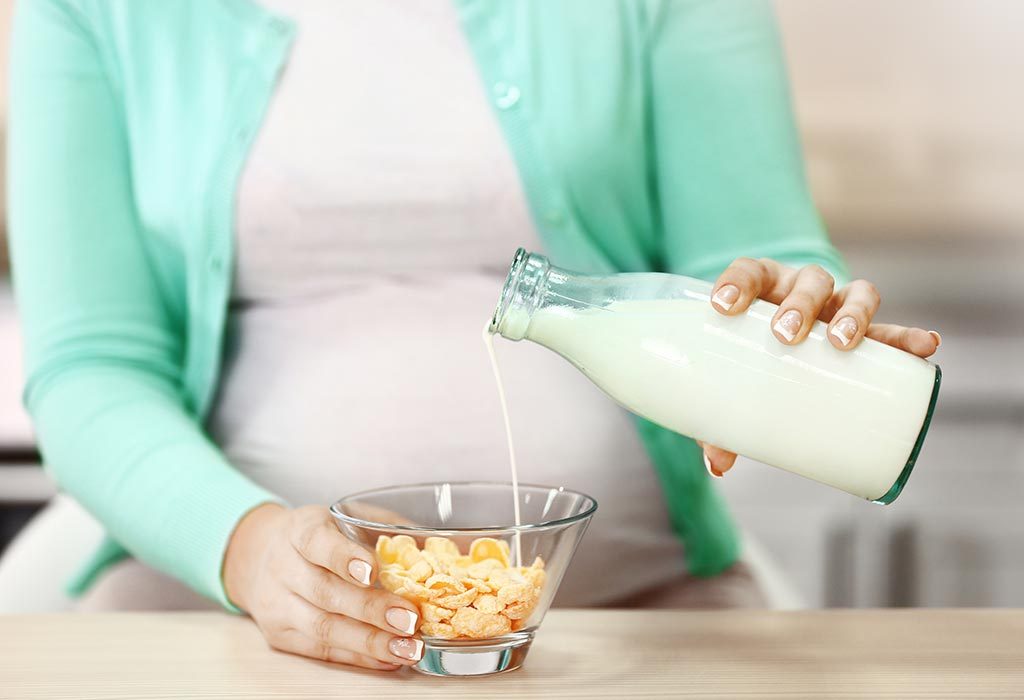In this Article
- Calories Needed in the First Trimester
- Calories Needed in the Second Trimester
- Calories Needed in the Third Trimester
- Pregnancy Calorie Calculator
- How to Know You Are Getting Enough Calories During Pregnancy
- How to Increase Calorie Consumption During Pregnancy
- How to Maintain the Calorie Count During Pregnancy
- Common Food-Related Misconceptions During Pregnancy
That you need to eat for two during pregnancy is a common misconception among many people. While you don’t need to stack up on an extra plate for your developing baby, you will need to increase the intake of calories during pregnancy slightly. An average person may consume up to 2000 calories daily, depending on their activity levels, age and weight. However, the calorie consumption needs to be increased a tad bit for pregnant women to get through the term and provide enough nourishment to the little life in their wombs. In this article, we shall address the most common concerns about calorie consumption during pregnancy. Read on to know more.
Calories Needed in the First Trimester
You may stick to your usual calorie intake during your first trimester; you don’t need to make drastic changes to your diet. However, some women may experience weight loss due to morning sickness. An additional 100 calories during the first trimester can help keep a continuous supply of nutrients to the body. Morning sickness also tends to dehydrate, so ensure you drink plenty of water and stay sufficiently hydrated throughout your pregnancy.
Calories Needed in the Second Trimester
As you step into the second trimester, you may notice that your appetite has increased as your baby needs more nutrients to develop. It’s when you need to pay proper attention to what you are eating daily. Ideally, during the second trimester, you will need an additional 300 to 350 calories per day, bringing your total daily calorie count to about 2300 to 2500.

Calories Needed in the Third Trimester
You will need an additional 300 calories in your third trimester to supplement the nutritional needs of your growing baby. The third trimester may bring in bouts of heartburn and make it difficult for you to eat. You can overcome this by breaking up your meals into smaller portions throughout the day. A glass of milk may also help to alleviate heartburn.
If you’re of average weight, then 11 to 15 kg weight gain during pregnancy is ideal. The number is a little lower for overweight women (7 to 11kg) and a little higher for underweight women (12 to 18kg).
Since we are essentially talking about calorie consumption during pregnancy, you’d want to keep track of the calories you consume with the help of a pregnancy calorie calculator. Read on to know what aspects the pregnancy calorie calculator focusses upon.
Pregnancy Calorie Calculator
Every woman is different and will have different requirements regarding calorie intake, even during pregnancy. The number of calories essential for a pregnant woman depends on various factors, including the following:
- Body Mass Index
- Height
- The level of activity
- Rate of metabolism
- Multiple pregnancies (twins or more)
Numerous calculators and apps take in some of these details to give you a total count of calories that you need to consume during different each trimester. Pregnancy will affect your eating habits. Morning sickness, food cravings, allergies, etc. can disturb your diet and lead to either excessive or less calorie consumption if you do not track it. So, how much should you consume? Let’s find out.
How to Know You Are Getting Enough Calories During Pregnancy
Although consuming the right amount of calories is recommended during pregnancy, it is not a rule that you need to stick to every calorie count strictly. What is more important is to eat healthy foods to supplement your baby’s development. While you can measure your calorie consumption with the help of a pregnancy calorie calculator, you must remember that, if you are eating healthy and providing all the nutrients to your baby, you are on the right path. Your timely checkups and the ultrasounds should help you confirm this.
You can also keep a tab on your weight and ensure that your pregnancy weight is between the expected range based on your body characteristics and lifestyle. When in doubt, you can also take medical advice on this.
In case your medical practitioner has confirmed that you need to increase your calorie count, he/ she prescribe ways to do it. In case you need some guidance over it, the next subhead should help you.
How to Increase Calorie Consumption During Pregnancy
Your calorie intake during pregnancy should mainly comprise of healthy options like whole-grain foods, fruits, vegetables, low-fat dairy and lean meat. However, when your craving gets the better of you, the occasional pack of chips or chocolate bar may be excellent, but ensure to strike the right balance.

Here are a few food choices to increase calorie consumption for pregnant women. Each one of these meal combinations has about 200 calories, and all the bread and crackers are whole grain. So, you have something to alternate your snack or meal with now and then during pregnancy.
- A regular bowl of muesli, skimmed milk and an apple.
- Low-fat yoghurt with six to seven almonds.
- 50gms of cottage cheese with two slices of bread.
- A boiled egg with a slice of toast.
- 1 stick of mozzarella with an apple.
- 10 medium-sized crackers with a tablespoon of low-fat hummus and grated carrot, along with three dried apricots.
If you are wondering how you can maintain your daily calorie consumption, here’s what you can do.
How to Maintain the Calorie Count During Pregnancy
When the occasional craving becomes too much to handle, you may gain a lot of weight during pregnancy. Here are a few ways you can ensure that you get your daily intake of calories during pregnancy and stay satiated.
- Do not skip breakfast. If morning sickness makes it challenging to eat a full-fledged meal for breakfast, you can try some dry toast or crackers. You can have something brought to your bed before you wake up and finish the rest of the breakfast over the course of the morning.
- Regular exercise, adequate intake of water, and a sufficient supply of high-fibre food items in your diet can help you curb cravings and control your appetite.
- Make fruits and vegetables a part of your everyday diet. Fruits and vegetables contain essential fibres that can help you reduce blood pressure and also the risk of conditions like preeclampsia.
- Make sure that healthy foods are within reach. Fruits bowls, smoothies, dry fruits, low-fat yoghurt, etc. make it easier to opt for a healthy choice of snack when you are hungry.
- Add a small amount of protein, like lean meat, with each meal. This will help balance out your meals and keep you full for longer.
Pregnancy comes with its own set of myths and facts. You will come across people – family, friends, distant relatives and even your neighbours who’d have tonnes of advice for you. Some recommendations might be useful, but some might create confusions too. Let’s take a look at a few common misconceptions that you might come across while you are making those minor adjustments to meet your daily calorie count during pregnancy.
Common Food-Related Misconceptions During Pregnancy
Here are a few common misunderstandings that surround pregnancy nutrition. We shall try to answer as many as possible in this section of the article; however, if you have more questions, you may seek medical advice.
1. Eating For Two
While you need to consume some extra calories to provide nutrition to your baby, by no means will you need to eat for two. You must balance your food consumption with the help of a healthy diet plan.
2. No Fish During Pregnancy
Certain fish with high mercury content should be avoided during pregnancy. But, that does not mean you should completely abandon fish from your diet. If you are comfortable eating fish, you may consume sardines, salmon, rohu, and catla (carp) in moderate amounts. Balanced consumption of low or no-mercury fish can also contribute to the cognitive development of the baby in your womb.
3. Cold and Sour Food Can Cause Flu in Mothers.
This myth stems from an age-old belief. In reality, Vitamin C is essential to aid the absorption of iron in the body, which would-be mothers need to prevent anaemia.
4. Papaya and Pineapples Can Cause Miscarriages or Abortions.
Only raw papayas and pineapples contain specific enzymes which, when consumed in large quantities may cause uterine contractions. However, ripe papayas and pineapples, when consumed in moderation are safe. Although, due to artificial ripening, traces of the harmful enzymes may remain in the fruits, which is why most pregnant women are suggested to steer clear of them.
Pregnancies are varied, and the need of every pregnant woman may be different. You do not need to keep track of all the calories you consume during your pregnancy if you eat a healthy and balanced diet, stay fit and maintain a healthy pregnancy weight. With some guidance and awareness, you will find this journey manageable and enjoyable, too, while you wait to welcome your healthy baby.
References & Resources:









